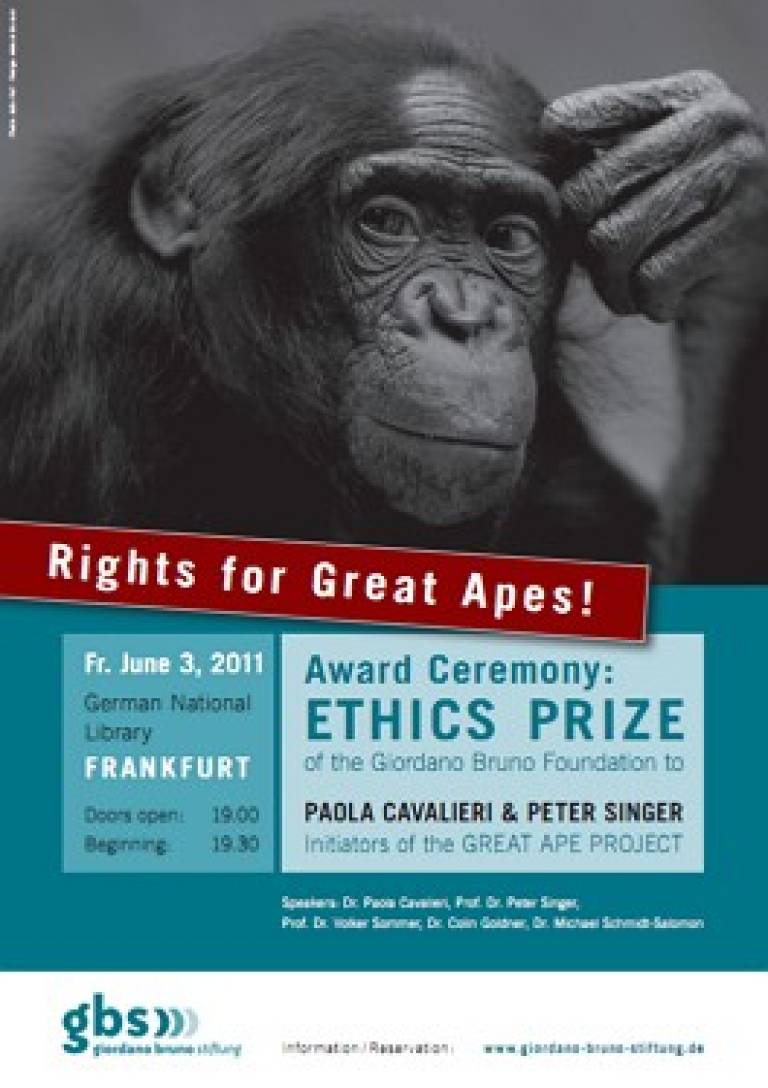Campaign "Rights for Great Apes"
03 June 2011, 12:00 am

Event Information
Open to
- All
The initiators of the "Great Ape Project", Philosophers Paola Cavalieri and Peter Singer, will receive the ethics prize of the Giordano Bruno Foundation (www.giordano-bruno-stiftung.de). The award ceremony takes place on 03June11 at the German National Library (Deutsche Nationalbibliothek) in Frankfurt am Main. Speakers include the philosopher and GBS spokesperson Michael Schmidt-Salomon, evolutionary anthropologist Volker Sommer (UCL), animal rights activist Colin Goldner as well as Paola Cavalieri and Peter Singer.
The Giordano Bruno Foundation (GBS) is a think-tank for humanism and enlightenment, supported by many renowned scientists, philosophers, artists and intellectuals. The GBS is mainly active in German-speaking countries, although its overarching goals of working towards an "evolutionary humanism" are similar to those of the British Humanist Association (www.humanism.org.uk). A previous GBS prize was bestowed upon evolutionary biologist Richard Dawkins.
Peter Singer will speak again ("What can Neuroscience tell us about Ethics?") on 04June11 at the FIAS (Frankfurt Institute for Advanced Studies). The event includes a podium discussion between Peter Singer, leading neurobiologist Wolf Singer and neuroethicist Kathinka Evers, moderated by the philosopher Thomas Metzinger (18:00, Casino Westend Campus; http://fias.uni-frankfurt.de/philosophie/).
Volker Sommer, UCL professor of Evolutionary Anthropology, helped to develop and supports the current campaign "Rights for Great Apes" in various ways:
- The German radio station "Deutschlandfunk" will broadcast a 90-min interview with Volker Sommer on Sunday 05June11, 13:30-15:00 (www.dradio.de/dlf/vorschau/).
- The Heidelberg Forum - Biosciences and Society hosted a public talk by Volker Sommer in the Print Media Academy on 19May11, followed by a reception for the hundreds of attendees, and jointly organized by the European Molecular Biology Laboratory, German Cancer Research Centre and Medical Faculty of the University of Heidelberg.
- The philosophy department of Kassel University plans a similar event for 22June2011 (19:00, Diagonale 9, R. 0422, www.uni-kassel.de/philosophie).
- The topics of animal rights and evolutionary humanism are likewise featured in a recent 45-min TV documentary about Volker Sommer's work and life produced by the French-German culture channel ARTE ("Ich bin ein Menschenaffe"; you-tube link: v=3KdwQltR6PU).
- The goals of the Great Ape Project are implicitly and explicitly featured in a recent bilingual book produced by editionPanorama, a publisher known for its high-end products: Jutta Hof (photography) / Volker Sommer (text): "Apes Like Us. Portraits of a Kinship. - Menschenaffen wie wir. Porträts einer Verwandtschaft" (ISBN-10: 3-89823-435-5).
- An international conference planned for 2012/13 will discuss recent calls to enlarge the genus Homo by including chimpanzees and bonobos under the names Homo troglodytes and Homo paniscus.
- A pdf of the brochure "Brother Chimp, Sister Bonobo. Rights for Great Apes!" - written by Volker Sommer and Michael Schmidt-Salomon - can be downloaded from: www.giordano-bruno-stiftung.de/materialien/broschueren-flyer-stiftung.
RATIONALE FOR THE ETHICS PRIZE
Philosophers Peter Singer and Paola Cavalieri initiated "The Great Ape Project" in 1993. It demands to extend some of the privileges currently reserved for human beings to orangutans, gorillas, bonobos and chimpanzees: the right to life, the right to individual liberty, and the prohibition of torture. These demands are basic and they remain measured - because nobody requests a right to education for bonobos, voting rights for gorillas, data-protection rules for chimpanzees or a minimum age for sexual consent amongst orangutans. Initially supported by eminent primatologists such as Jane Goodall, Toshisada Nishida, Roger Fouts, Adriaan Kortlandt and Robin Dunbar, the Great Ape Project simply wants to expand the "community of equals" in certain aspects. For example, it should be unlawful to inflict pain on great apes for the alleged benefit of others - as is done in biomedical experiments. Moreover, their freedom should not be arbitrarily deprived - although it is recognised that, for their own good, apes born in captivity might need to be kept in a zoo or in a sanctuary where they were brought to as orphans after hunters had killed their mothers. Defenders of the project would also like to see that great apes are recognized as "persons", given that their complex mental landscape includes consciousness, emotions and sophisticated cognitive abilities such as forward planning and empathy.
Demanding basic equality for great apes is the logical extension of a historical trend. Ethical sentiments amongst humans were first restricted to one's own relatives, then extended to clans, later to members of larger societies, and eventually to all people - with the UN Declaration of Human Rights. Why should we stop short here and ignore the interests of beings that experience suffering and joy in ways very similar to us - merely because they are not human beings? Humans have strived to defeat nationalism, racism and sexism. We believe the historic moment has come to overcome a further barrier - that of "speciesism", which justifies discrimination based on species membership. (Of course, some would like to extend equality to many other animals as well - whereas others assert that we should presently only go as far as to include all great apes. In any case, working towards the goals of the Great Ape Project does not mean we stop considering the fair treatment of other animals.)
Interests of humans unable to speak up for themselves - such as infants or those afflicted by conditions such as Alzheimer's - are represented by guardians. Guardians can therefore also safeguard the legal rights of great apes. Legislation to this end has already been drafted in New Zealand and Spain. The Giordano Bruno Foundation supports these efforts, as they arise logically from its guiding principle of evolutionary humanism: as human beings, we are not the "crown of creation", but organisms brought about by evolutionary processes. As Albert Schweitzer put it, we are "life that wants to live, in the midst of life that wants to live." This premise should be reflected in a more responsible approach to the lives of non-human animals - and especially in our relationship with those organisms with whom we share a close evolutionary history.
 Close
Close

